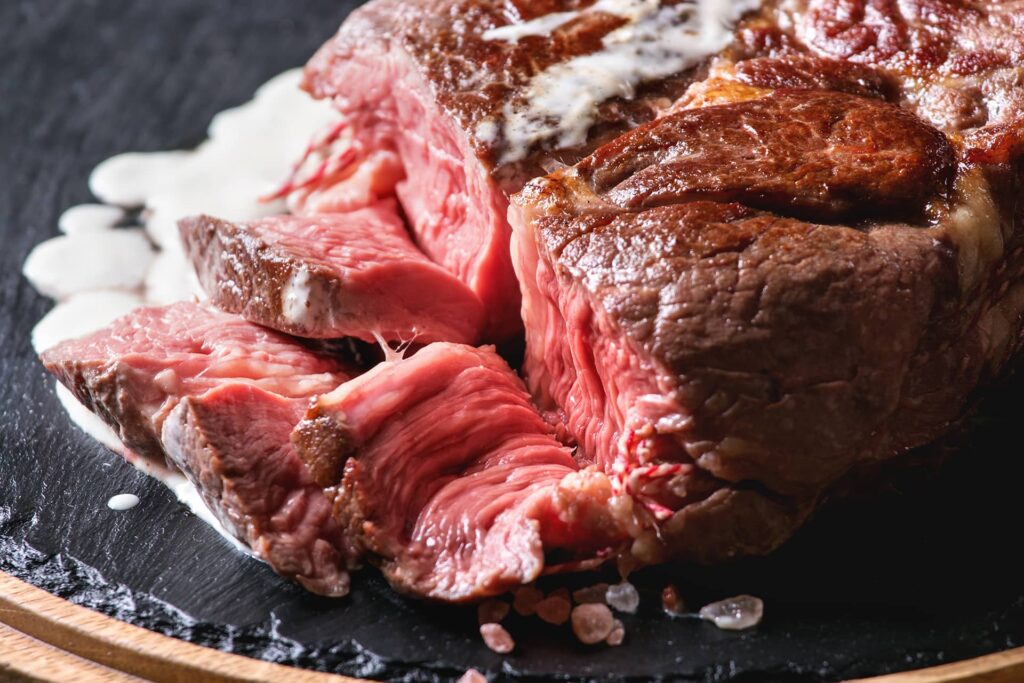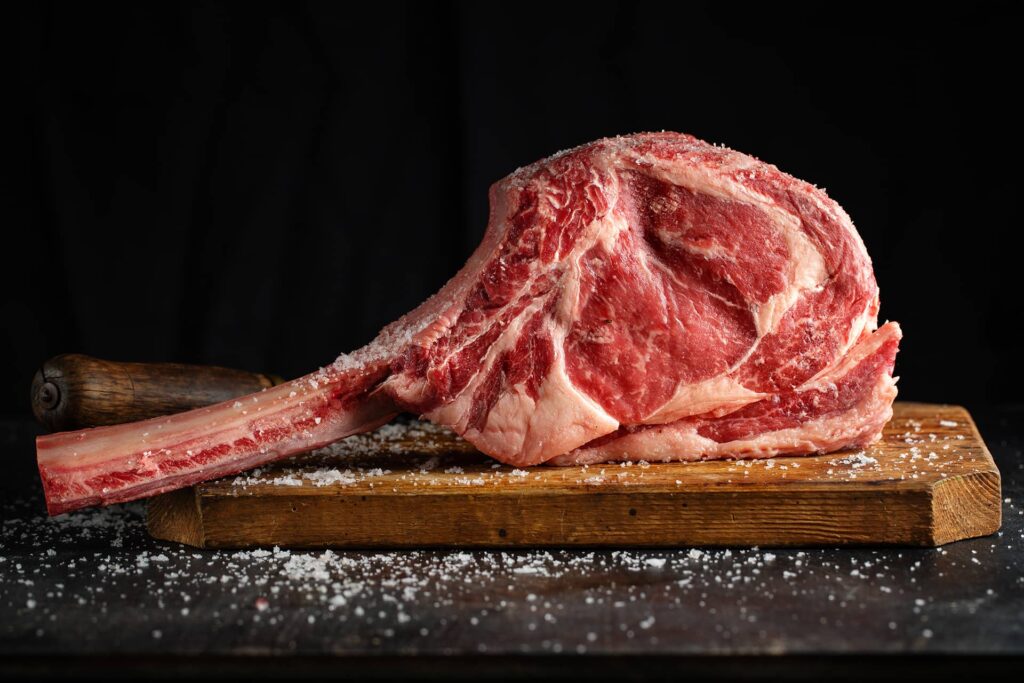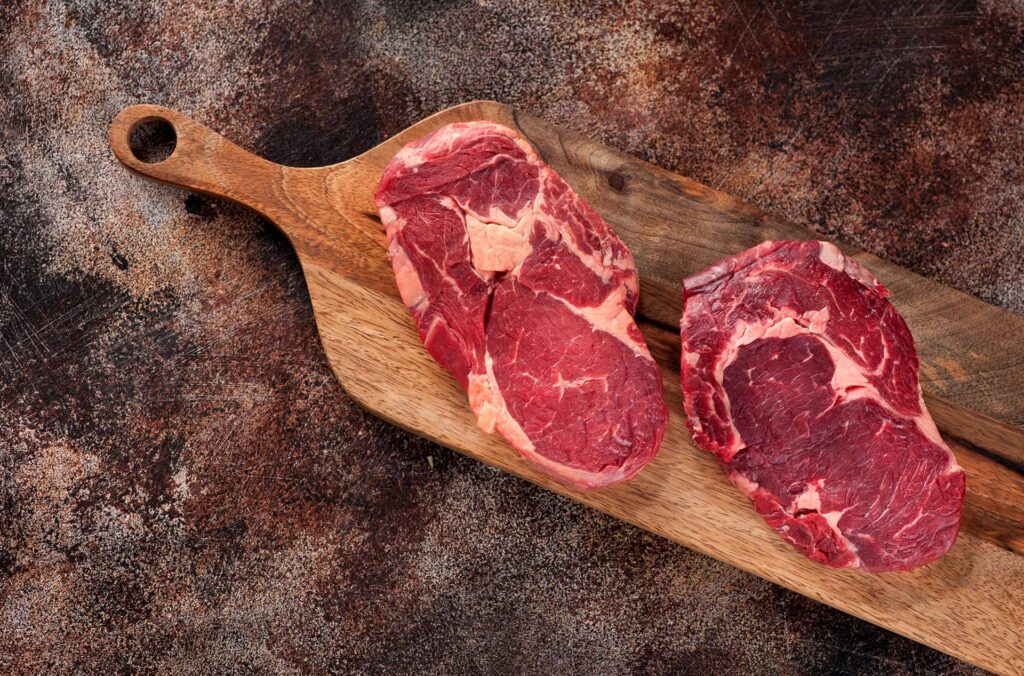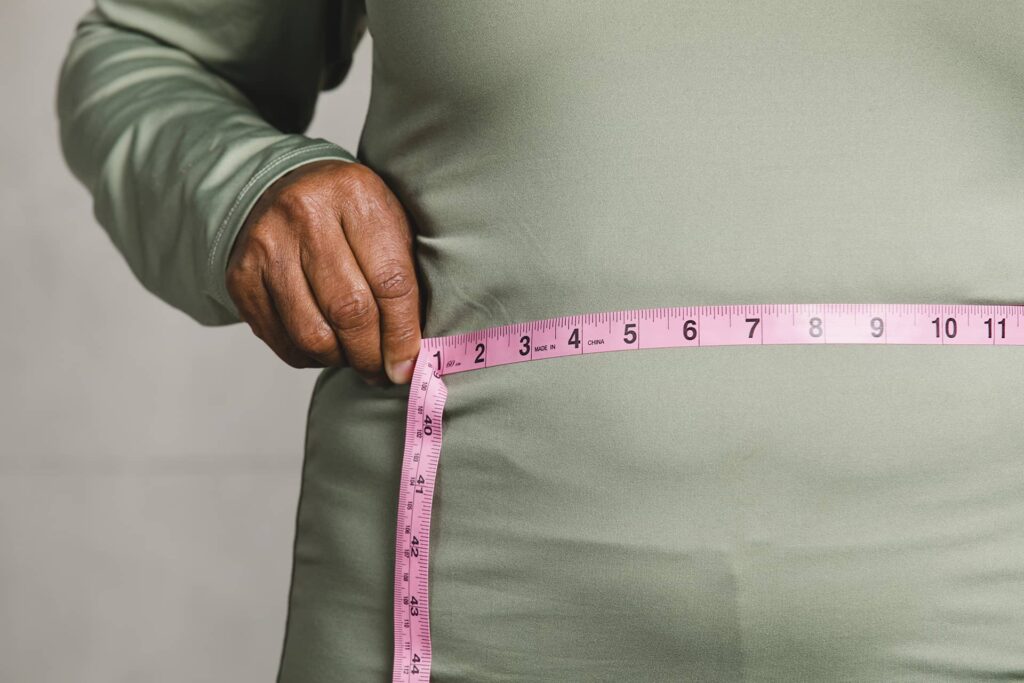How to Lose Weight With a Carnivore Diet
If you’re struggling with weight loss or aiming to shed those extra pounds more efficiently, you’ve landed in the right place. Prepare yourself for a journey towards weight loss without enduring constant hunger.
Our traditional notions about weight reduction, emphasizing eating less and exercising more, can be demanding and reliant on substantial willpower. The endless counting of calories, rigorous daily workouts, and attempting to suppress your hunger can often lead to people giving up. Sadly, the focus on calorie counting has not been very effective in addressing the current obesity epidemic. Thankfully, there is a more effective approach.
The key takeaway is this: weight loss isn’t solely dependent on calories. It’s also influenced by hormonal regulation. If you can reduce your hunger and the levels of hormones responsible for storing fat, you’re likely to find it easier to shed those excess pounds. So, here are the top tips for successful weight loss.
Hormones and Weight Loss
When hormones are mentioned, we usually think of the sex hormones such as testosterone or estrogen. These can definitely affect weight loss if they are imbalanced, but they aren’t the only hormones in play. Appetite is controlled by hormones as well! When the body needs more fuel, a hormone called ghrelin is released from the stomach, small intestine, pancreas and even the brain itself. This hormone stimulates appetite, and drives us to eat. When we have eaten enough to replenish our fuel supply, another hormone named leptin is released from fat cells and the small intestine. Leptin stimulates satiety, suppressing hunger so that we know that we are done eating. Imbalances in this control system can result in persistent hunger, a lack of satiety, and continual weight gain.
The choice of foods is the single most important variable that we can control which determines the balance of leptin and ghrelin, though other variables such as stress or fatigue can also factor into the equation. Let’s talk about what can be done to help restore ghrelin and leptin balance.
Choose a Carnivore Diet
To start your weight loss journey, begin avoiding sugar and starchy foods like bread, pasta, and potatoes. A carnivore diet focuses on eating meat, eggs, seafood, and full-fat dairy to the exclusion of all plant foods. That’s right; no vegetables and no fruit, as well as no grains. It’s also an effective low-carbohydrate diet, and easily can be tailored into a ketogenic diet. For over 150 years, many weight loss diets have revolved around reducing carb intake. Modern scientific studies support low-carb diets as equally effective or even superior to other dietary approaches.

Eat When Hungry
On a carnivore diet, you can trust your hunger and satiety signals. You can eat when you’re hungry and skip meals if you’re not. Some find success with intermittent fasting as well, though this should be approached cautiously if taking blood pressure or blood glucose medications.

Eat Real, Unprocessed Food

Eat Only When Hungry (Avoid Unnecessary Snacking)
Unnecessary snacking can be a challenge, even if you’re no longer eating processed foods, nuts, and starchy snacks. Snacking can be triggered by habits, stress, or other factors. Eating when you’re not hungry can slow down your weight loss. One of your goals on a carnivore diet should be to learn how to trust your hunger and satiety cues. While this may not have been possible on your previous diets, most people find this works quite well on a carnivore diet.

Measure Your Progress Wisely
Instead of focusing solely on the scale, track your body composition by measuring your waist circumference. This provides a more accurate representation of fat loss. Weight to height ratio is a better indicator of metabolic health than BMI or body mass index. To calculate your ratio, measure your waist circumference in inches (around the biggest part of your belly) and divide it by your height in inches. A healthy ratio is .5 or a little less.

Be Persistent
Rapid, unsustainable weight loss is often a recipe for yo-yo dieting. Set realistic expectations and aim to lose 1-3 pounds per week. It’s a gradual process. Learning to follow your hunger and satiety cues will help, while forcing yourself to remain hungry most of the time is not sustainable.

Avoid Eating Fruit
Fruit is high in sugar. Eating fruit can overload your system with sugar, and keeps your body from burning fat for fuel instead.

Avoid Drinking Beer
Beer is rich in carbs that interfere with fat burning. Opt for lower-carb alcoholic beverages like dry wine, champagne, or hard liquor in moderation.
Remember that the journey to weight loss is a long-term endeavor. Sustainable change in your eating habits and lifestyle is the key to maintaining your weight loss. Avoid quick fixes and fad diets. Patience and adaptability are your allies as you work towards a healthier you.

Avoid Artificial Sweeteners
When aiming to manage your weight, consider avoiding non-caloric artificial sweeteners. Many people substitute sugar with these sweeteners to reduce calorie intake and promote weight loss. Although it seems like a plausible strategy, various studies have failed to establish a significant weight loss benefit when replacing sugar with non-caloric sweeteners.
Scientific research suggests that these sweeteners might actually increase your appetite and maintain cravings for sugary foods. An independent study recently indicated that switching from sweetened beverages to water can lead to weight loss, particularly in women. This phenomenon could be linked to the potential increase in insulin secretion associated with certain non-caloric sweeteners.
If you’re encountering difficulties in shedding excess weight, it’s advisable to steer clear of artificial sweeteners. As an added benefit, you’ll likely rediscover the pleasure of the natural sweetness in whole foods once you’re no longer accustomed to the overpowering sweetness of processed low-carb items and “diet” sodas.

Sugar Addiction
If the idea of avoiding sweeteners seems nearly impossible for you to envision, remember that overcoming addiction-like relationships with sugar and carbohydrate-rich foods is achievable. Explore how to break free from being addicted to sweet flavors.

Review Your Medications
Numerous prescription medications can hinder your weight loss efforts. Therefore, it’s crucial to discuss any changes in your treatment regimen with your healthcare provider. Here are the top three common culprits:
Insulin Injections
Especially at higher doses, injected insulin often creates a significant obstacle to weight loss for individuals with diabetes. To reduce your insulin requirements, consider the following:
Consume fewer carbohydrates, which simplifies weight loss as lower carb intake leads to reduced insulin needs. A carnivore diet accomplishes this goal easily. It’s essential to collaborate closely with your healthcare provider to safely lower your insulin doses.
If lowering carb intake doesn’t suffice, metformin, an insulin-sensitizing drug, may help decrease insulin dependency, particularly for individuals with type 2 diabetes.
If metformin doesn’t provide adequate relief from insulin dependence (again, mainly for those with type 2 diabetes), consult with your doctor about trying medications from newer classes like GLP-1 analogues or DPP-4 inhibitors. These drugs, which have various options, can decrease insulin requirements and may facilitate weight loss through mechanisms beyond insulin reduction.

Pills
Certain diabetes medications, such as sulfonylureas, which stimulate insulin secretion by the pancreas, are notorious for causing weight gain.
Examples include:
- Amaryl (glimepiride)
- Glucotrol/Minodiab (glipizide)
- Euglucon (glibenclamide)
- Daonil (glyburide)
Cortisone and Glucocorticoids
Commonly prescribed cortisone and other glucocorticoids, such as:
- prednisone
- prednisolone
- dexamethasone
These drugs may lead to weight gain over time, especially at higher doses. These medications may be necessary in some cases, but their dosages should be closely monitored in collaboration with your healthcare provider to prevent excessive usage.
Several other medications, including neuroleptics/antipsychotic drugs, some antidepressants, certain contraceptives, blood pressure medications (beta blockers), epilepsy drugs, allergy medications, antihistamines, and antibiotics, can potentially interfere with weight loss. Thus, it is recommended to use these medications only when necessary.
Manage Stress and Prioritize Sleep
Have you ever longed for more hours of sleep and a less stressful life? Most individuals can relate to this desire. Chronic stress and insufficient sleep can have detrimental effects on your weight.
Chronic stress and inadequate sleep can elevate the levels of stress hormones like cortisol in your body, leading to increased hunger, overeating, and weight gain. If you are working on losing weight, it’s essential to explore strategies for reducing or better handling excessive stress in your life. While this may require substantial changes, it can have an immediate impact on your stress hormone levels and, consequently, your weight.
Moreover, prioritize getting sufficient, high-quality sleep each night. Aim to wake up feeling refreshed without relying on an alarm clock. If you usually find yourself rudely awakened by an alarm, it may be because you’re not allowing your body to receive proper rest.
One way to address this issue is to go to bed early enough to enable your body to wake up naturally before the alarm goes off. Ensuring you enjoy a good night’s sleep can also help reduce stress hormone levels.
On the contrary, sleep deprivation often increases sugar cravings and weakens self-discipline, making it easier to succumb to temptation. Sleep-deprived individuals are less likely to stick to their workout routines. If you experience difficulties with sleep, consider the following helpful tips:
- Maintain a consistent bedtime each evening. This practice can help your body prepare for sleep at that designated time.
- Avoid consuming coffee after 2 pm, as caffeine takes time to leave your system.
- Limit alcohol intake to at least three hours before bedtime. Although alcohol might make you drowsy, it can negatively affect sleep quality.
- Engage in regular exercise in the morning. Physical activity in the early part of the day can aid in falling asleep more easily. Some individuals may find that exercising later in the day can be stimulating and hinder sleep, although this varies based on individual reactions.
- Ensure you get at least 15 minutes of sunlight exposure daily. This supports your circadian rhythm or “body clock.”
- Finally, ensure your bedroom is sufficiently dark and kept at a comfortable temperature to optimize sleep quality.

Reduce Dairy Consumption
Is it possible to eat as much as you want and still lose weight? This strategy often proves effective on a carnivore diet, as this diet typically enhances appetite regulation. However, within the realm of the carnivore diet, there are still foods categorized as animal-sourced but lacking in satiety, potentially causing weight loss challenges when consumed in excessive quantities. Dairy products often have that effect for anyone who is having trouble losing weight. If you’re struggling to shed excess pounds on a low-carb diet, consider minimizing the following foods:
Dairy Products (yogurt, cream, cheese, milk) Dairy products contain varying levels of lactose (milk sugar) and provide significant calorie content from fat. Overconsumption of these products may hinder weight loss. It’s important to remember that highly palatable foods can rapidly lead to excessive calorie intake.
When it comes to butter, you need not be concerned about additional carbs, as butter consists primarily of fat. However, like any other fat source, excessive consumption of butter can result in an accumulation of calories that may be burned for energy instead of body fat.

Considering Vitamin and Mineral Supplements?
Your body requires essential vitamins and minerals to function optimally. There is evidence that the human body’s needs for vitamins and minerals may be quite different on a carnivore diet. While some individuals may have a specific need for a vitamin or mineral, perhaps due to their health history or genetic polymorphisms, the majority of people on carnivore diets thrive without taking any supplements. As meat provides very bioavailable micronutrients, a carnivore diet is likely to fulfill your needs for vitamins and minerals.
Vitamin D
Vitamin D deficiency is widespread in northern regions like Canada and parts of the United States. Research on the relationship between vitamin D and weight is inconclusive, and taking vitamin D doesn’t guarantee weight loss. However, some studies suggest that vitamin D supplementation can help reduce fat mass or waist measurements, even without significant weight loss.
In one study, 77 overweight or obese women received either a daily 1000-unit vitamin D supplement or a placebo for three months. Although total weight loss was similar, the vitamin D group experienced an average body fat reduction of 2.7 kg (about 6 pounds), significantly more than the placebo group, which lost only 0.4 kg (less than 1 pound) of fat.
If eggs are included in a carnivore diet, they can provide significant vitamin D. Red meat and liver are also sources of very bioavailable vitamin D.
Multivitamins
There’s limited and low-quality data regarding the use of vitamin and mineral supplements for weight loss. However, a 2010 clinical trial involving about a hundred women with weight concerns divided them into three groups. One group received a daily multivitamin supplement, another a daily calcium supplement, and the final group took a placebo. The study continued for six months.
As expected, the results showed that the weight of the women who received calcium or the placebo remained unchanged. In contrast, the group that received the multivitamin lost an additional 3.6 kg (about 8 pounds) on average and exhibited improved health markers. Among the benefits, their basal metabolic rate (the rate at which the body burns calories at rest) increased slightly. While the differences were small, they were statistically significant.
As the foods eaten on a carnivore diet provide calcium in a very bioavailable form, this may be one of many reasons why so many people experience great weight loss on a carnivore diet.
Explore Intermittent Fasting

Intermittent fasting can be a potent tool for weight loss, though it requires careful consideration. If you find yourself stuck in a weight loss plateau despite adhering to other weight loss strategies, intermittent fasting may be a valuable approach to accelerate your progress.
Intermittent fasting entails abstaining from eating during specific time intervals. One of the most popular methods is the 16:8 approach, where you fast for 16 hours (including sleep) and eat during an 8-hour window. This is relatively easy to implement on a low-carb or high-satiety diet. Fasting can be from 8 pm to 12 noon, for instance, which equals 16 hours of fasting. Another option is skipping dinner and having breakfast and lunch within an 8-hour window, for example, from 8 am to 2 pm, and not eating again until 8 am the following morning.
Numerous variations of intermittent fasting exist, but the 16:8 method is often recommended as an initial choice. It is typically effective, convenient, and doesn’t require calorie counting.
You can practice a 16:8 fast as often as you prefer, whether it’s twice a week, weekdays only, or daily. On a low-carb or keto diet, some individuals naturally adopt this habit as they experience reduced appetite.
However, it’s important to note that frequent fasting may potentially lower your resting metabolic rate, similar to continuous caloric restriction, which could make long-term weight loss and maintenance more challenging. Additionally, some individuals may experience an increased urge to overeat during their eating window when they initially attempt intermittent fasting. If that’s the case, it might not be the right time to implement intermittent fasting. Focusing on a higher-satiety eating approach first may reduce hunger and diminish the desire to overeat during the eating window.
There are other intermittent fasting methods, including fasting for 24 hours once or twice a week or adopting the 5:2 diet, which involves eating normally for five days and consuming a calorie-restricted diet for two days (typically 500 calories for women and 600 calories for men). However, these methods require calorie counting and more planning.
It’s important to reconcile intermittent fasting with the recommendation to eat when hungry. Although they seem contradictory, the primary advice is to eat when hungry and feel satisfied at meals. If this isn’t effective for you, intermittent fasting can be a valuable addition to your toolkit. Always remember that during non-fasting periods, you should eat until you are satisfied.
Intermittent fasting is not the same as calorie counting and continuous starvation. Starving yourself is likely to lead to misery and failure. Instead, intermittent fasting is about providing your body with the nutrition it needs while allowing it to rest from constant eating.
During fasting periods, it’s essential to stay hydrated. Water is the preferred drink, and coffee and tea without added calories are also acceptable. In longer fasts, consider adding a small amount of salt or consuming bouillon.
In between fasts, adhere to the other weight loss tips mentioned above, such as adopting a low-carb or high-satiety diet. On a low-carb diet, hunger is typically reduced, making fasting easier and more effective. Additionally, low-carb or carnivore diets can deplete liver glycogen stores, which might shift your body into fat-burning mode earlier during fasting. This could be one of the mechanisms that enhances weight loss. Therefore, intermittent fasting and a carnivore diet can be a synergistic combination, making it more comfortable and effective to implement both strategies simultaneously.
However, intermittent fasting may not be suitable for everyone:
- If you have a history of disordered eating, it’s recommended to consult your physician before trying intermittent fasting.
- If you are experiencing high stress levels or lack of sleep, address these issues first, as fasting may exacerbate stress on your body.
- If you are taking medications, especially insulin, consult your doctor before attempting intermittent fasting, as adjustments to medication doses may be necessary.
- Pregnant women, breastfeeding women, and growing children should avoid extended fasting periods due to their heightened nutritional requirements. Instead, they should eat when hungry and consider the other tips in this guide if weight loss is a concern.
Weight loss can be challenging, but by incorporating these tips and strategies into your routine, you can improve your chances of success. Remember that what works for one person may not work for another, so it’s essential to find an approach that suits your individual needs and preferences. Additionally, consulting with a healthcare provider or registered dietitian can provide personalized guidance and support on your weight loss journey.
Exercise Helps, But Not as Much as Diet
It’s noteworthy that exercise is listed on this weight loss guide because its impact on weight loss is often overestimated. Shows like “The Biggest Loser” depict extreme workout regimens and severe caloric restrictions that are impractical for most people over the long term. Simply opting for the stairs over the elevator or getting off the bus one stop early won’t lead to significant weight loss. In fact, studies indicate that starting exercise alone typically requires at least 30-60 minutes of daily workouts to observe noticeable weight reduction. One reason for this is that exercise can increase appetite, offsetting its potential benefits for weight loss. While exercise offers valuable health improvements, it’s vital to understand that it can’t compensate for poor dietary choices and other lifestyle factors. Therefore, focus on diet quality before emphasizing exercise.

Ketone Levels and Weight Loss
For individuals following a carnivore diet who have already followed the initial tips and are still struggling with weight loss, considering the controversial strategy of raising ketone levels may be beneficial. This strategy mainly targets those who have reached a weight plateau on a carnivore diet. To explain, a carnivore diet reduces insulin levels, enabling the body to access stored fat for energy. Elevating ketone levels can enhance this fat-burning process. You can measure your ketone levels at home using easily purchased devices, offering insights into your body’s fat-burning state. The ideal range for nutritional ketosis is between 0.5-3.0 mmol/L. However, it’s crucial to focus on dietary and lifestyle changes first before delving into ketone manipulation.

Hormones and Weight Loss
When you’ve followed the previous tips, made significant lifestyle adjustments, ruled out medication and nutrient deficiencies, and still struggle to achieve a healthy weight, hormonal imbalances could be a contributing factor. Three common areas to investigate are thyroid hormone, sex hormones, and stress hormones. An underactive thyroid can lead to a slower metabolism, causing symptoms like fatigue, cold intolerance, constipation, dry skin, and weight gain. Measuring thyroid-stimulating hormone (TSH) levels is the first step. For sex hormones, imbalances can affect weight, particularly for women with polycystic ovarian syndrome (PCOS) or during menopause. For men, declining testosterone levels can lead to weight gain. Stress hormones, such as cortisol, can also contribute to weight gain. Chronic stress, lack of sleep, and cortisone medications are common culprits. Addressing these underlying issues is essential, as hormonal supplements might not provide lasting weight loss benefits if the root cause isn’t resolved.
Help others regain health using the carnivore diet!

Reviewed & approved by
Dr. Shawn Baker, MD & Carnivore.Diet team.
